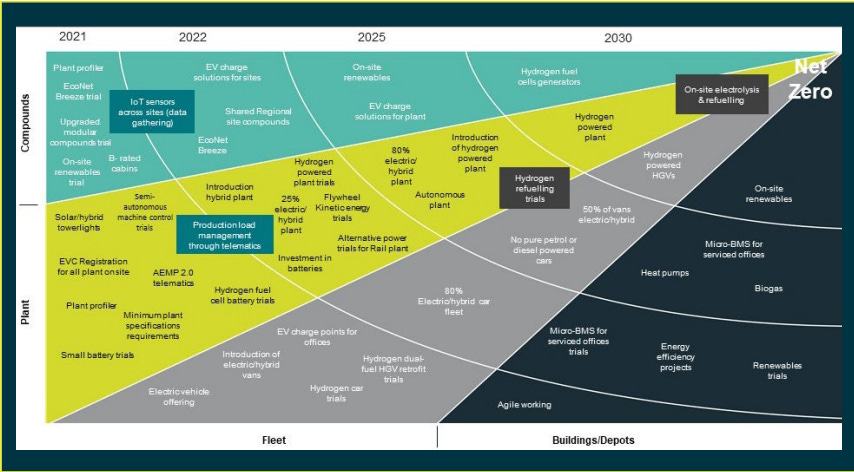Flying with Mr. Skidmore
We first heard of the Skidmore Review in the Growth Plan. A scramble and a sprint across the airfield and now the cabbage crates are up and heading out towards the briny.
Image: Imperial War Museums
Chris Skidmore MP has a busy three months ahead. From the standing start of its announcement in the Growth Plan on 23rd September, Mr. Skidmore and his team at BEIS now have until the end of December to produce the report that will ‘ensure we are delivering net zero in a way that is pro-business and pro-growth’. Oh, good.
Themed roundtables and direct consultations with the Great and the Good will, of course, comprise a big chunk of the activity and eventual output. But there’s also an online survey, open to the whole British public. If you read nothing else in this post, please take note of this and respond to it: the link to the online survey form is here and it closes on 27th October.
Here at the Green Edge, we like to think we’re critically observational rather than merely critical, so in that spirit we do have one observation. Given that the aim of the survey is described as a ‘call for evidence to provide an open channel to the general public to give their views on the transition, in particular giving a voice to the public and small and medium enterprises (SMEs)’, it would have been nice to start the survey with a couple of questions to determine in what capacity each respondent is responding. Are you representing an SME? Then branch to the questions specifically for businesses. Are you an individual? Then go to the public questions. All Survey 101 stuff really. As it stands, starting the survey by asking ‘How does net zero enable us to meet our economic growth target of 2.5% a year?’ might have a few members of the public throwing up their hands and getting back to their day jobs, instead of being conveniently branched to the few questions that are specifically included for them. Observation over.
The Green Edge will, of course, be submitting the survey in full, because despite its apparent hurriedness1, we do think it’s important and potentially worthwhile. But rather than grind through all thirty questions in this post, we thought it might be useful to bundle them loosely in relation to the three key aims of the Skidmore Team’s review. We’ve sectioned these off below.
HM Gov asks: how can our approach to Net Zero…
…deliver maximum economic growth and investment, driving opportunities for private investment, jobs, innovation, exports, and growth right across the UK?
Growth is the mantra right now across government and we see the biggest concentration of the more, shall we say, structured survey questions focused on that. We’ve already seen that Q1 is the overarching question asking for ideas on how net zero can enable the growth target, while Q8 asks a more focused question on growth opportunities for individual businesses. Stimulation of growth through investment and opportunities for UK plc in the international market also gets due attention, both in general terms (Q7) and for individual businesses (Q10).
Q15 is an interesting one: it asks businesses if they have opportunities to grow if there were more heat pumps, energy efficiency measures, EVs, hydrogen and clean power. The Green Edge has talked to quite a few businesses now that we think would say yes to this – start-ups and SMEs fitting EV infrastructure or deploying IoT, for example - as long as they can find the people and skills to do it.
No questions for the public (Q18-23) about growth, reasonably enough, but local governments are asked (in Q27) how the design of net zero policies, programmes, and funding schemes could be improved for local area consumption. And here, we feel, is an opportunity for the councils, unitary areas and boroughs to pool their responses and give a big shout to government. Similarly with the Chambers of Commerce, quite a few of which are now charged (and funded) to produce England’s Local Skills Improvement Plans (LSIPs) with (hopefully) a consistent dollop across them all of green skills development for immediate priorities like retrofitting, green construction and EV infrastructure installation.
And finally, a nod to academia on growth through innovation and technology development (Q29). Sure to be lots of ideas there.
…support UK energy security and affordability for consumers and business and the need to rapidly increase and strengthen UK energy production and supply?
After a rather plaintive question (Q6) about ideas for how government should balance its priorities to maintain energy security and still achieve net zero, there isn’t too much here by way of targeted questions. Opinions on fracking are, of course, not sought here. There is a specific question (Q16) to the clean power industry asking for barriers it’s seeing in getting going, but otherwise that seems to be it for energy. Perhaps the round tables and direct consultations with the E.ONs and Draxes of this world will sort this question out.
…minimise costs borne by businesses and consumers, particularly in the short-term?
Interestingly, a word search of the thirty questions for ‘cost’ finds a hit rate of exactly, er, zero. The terms of reference of the Review states that it will look at ‘how we can drive down the cost curve for net zero technologies’, but that’s more medium-term. What about the short term?
Well, we feel sure there will be plenty of responses about the effects of growing short-term costs, possibly in the replies to the several questions on challenges and obstacles to decarbonisation and net zero transition: to businesses (Q9, Q11); to the public (Q19, Q22); to local authorities (Q24); and in general (Q2). Hopefully, ideas for reducing those costs will come too, perhaps in the ‘what can government do to help’ questions (Q4, Q14, Q23 and others).
Bringing in the Green Skills agenda (as we do)
Unsurprisingly, a word search through the survey questions for ‘skills’ produces as many hits as it does for ‘cost’ – i.e. none. But we can understand that; after all, this is a survey by BEIS, not DfE. But we couldn’t resist looking for where some respondents might point to a coordinated green skills development effort.
We were particularly intrigued by Q3, which is rather clumsily worded2 but, in effect, asks how government can help businesses get to Net Zero and grow at the same time. This question links the first and third targets of the Skidmore Team’s work, how can businesses increase their top lines while decreasing their net zero cost lines? We would argue there are a few layers to this cake and green skills development is an essential ingredient throughout (perhaps treating training costs like R&D and gaining tax benefit recognition).
First, wouldn’t it be nice if government could build a roadmap to clarify how and when the UK, its regions and sub-regions will need to have the skills and people ready for the different green systems and technologies coming down the pipe? A national version, if you will, of this rather good example we spotted late last year from Balfour Beatty, showing its roadmap for reducing Scope 1 and 2 emissions:
Source: Balfour Beatty
Second, how about making sure the coordination between national targets and policies, and local delivery structures is as good as it can be? This is more than just about skills, of course, but looking at it through our skills lens, the LSIPs seem to us to be a pretty good start. But don’t let them get too scattergun – there are some good trailblazer examples out there to use as templates.
And third, leverage best-in-class place-based examples. In fact, the consultation also touches on this in Q25, where it asks for examples of successful place-based net zero projects. We can cite plenty: in Portsmouth, in Glasgow, in Surrey and through others by the likes of Ashden and UK 100 that we’ve reported on recently.
Overall, we remain cautiously optimistic that the Skidmore Team will listen to the good feedback it will undoubtedly get from the public and SMEs through the online survey. We do hope, though, that this data isn’t washed out too much by the big business lobby that will likely come through the Review’s more direct consultations. And finally, above all, the targets and key dates must remain in place if we are to achieve net zero.
Sponsor The Green Edge
To keep The Green Edge free to subscribers, we’re asking for sponsorship. Your sponsorship may be linked to a specific piece of content, a steer you would like to give us, or simply in recognition that we’re adding value to the green economy conversation. It could a one-off contribution or in more regular instalments. At whatever level, your support will be much appreciated.
To talk to us about sponsorship, please contact us via email by clicking the button below. Thank you.
Even with this hurriedness, the UK is the only country doing such a review, and the review will delay the publication of the UK’s Green Finance Strategy to 2023.
The actual question reads: What opportunities are there for new /amended measures to stimulate or facilitate the transition to net zero in a way that is pro-growth and/or pro-business? Bleugh!







